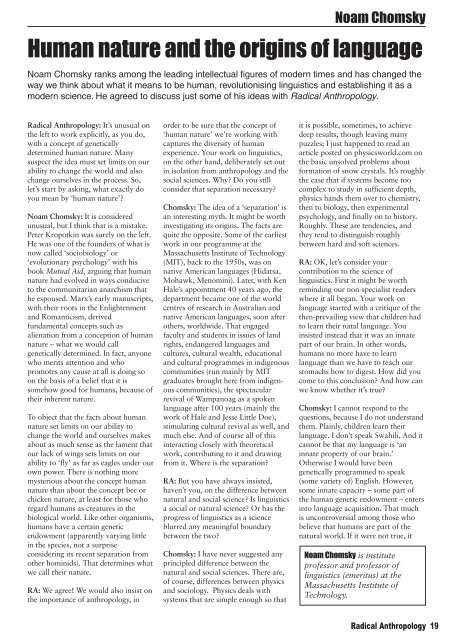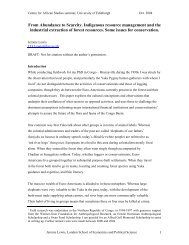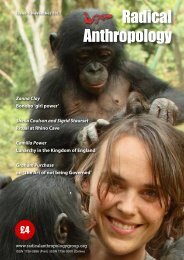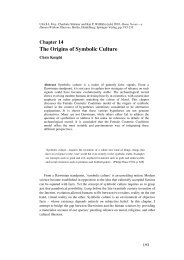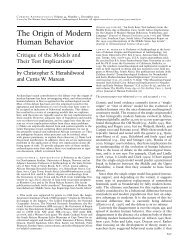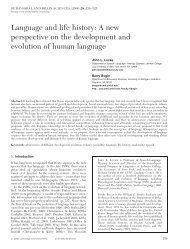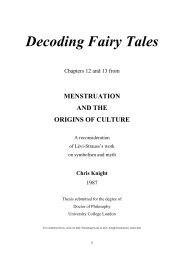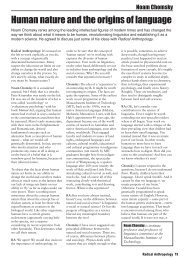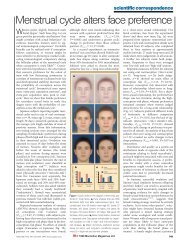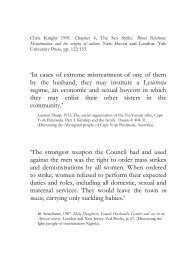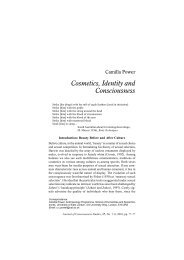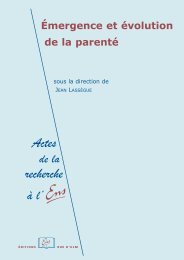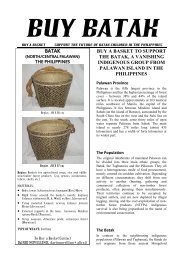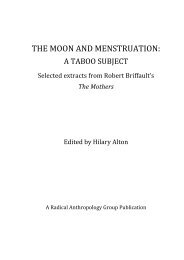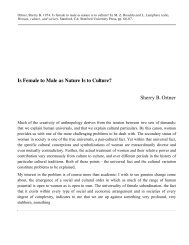The scarcity myth The scarcity myth - Radical Anthropology Group
The scarcity myth The scarcity myth - Radical Anthropology Group
The scarcity myth The scarcity myth - Radical Anthropology Group
You also want an ePaper? Increase the reach of your titles
YUMPU automatically turns print PDFs into web optimized ePapers that Google loves.
Noam Chomsky<br />
Human nature and the origins of language<br />
Noam Chomsky ranks among the leading intellectual figures of modern times and has changed the<br />
way we think about what it means to be human, revolutionising linguistics and establishing it as a<br />
modern science. He agreed to discuss just some of his ideas with <strong>Radical</strong> <strong>Anthropology</strong>.<br />
<strong>Radical</strong> <strong>Anthropology</strong>: It’s unusual on<br />
the left to work explicitly, as you do,<br />
with a concept of genetically<br />
determined human nature. Many<br />
suspect the idea must set limits on our<br />
ability to change the world and also<br />
change ourselves in the process. So,<br />
let’s start by asking, what exactly do<br />
you mean by ‘human nature’<br />
Noam Chomsky: It is considered<br />
unusual, but I think that is a mistake.<br />
Peter Kropotkin was surely on the left.<br />
He was one of the founders of what is<br />
now called ‘sociobiology’ or<br />
‘evolutionary psychology’ with his<br />
book Mutual Aid, arguing that human<br />
nature had evolved in ways conducive<br />
to the communitarian anarchism that<br />
he espoused. Marx’s early manuscripts,<br />
with their roots in the Enlightenment<br />
and Romanticism, derived<br />
fundamental concepts such as<br />
alienation from a conception of human<br />
nature – what we would call<br />
genetically determined. In fact, anyone<br />
who merits attention and who<br />
promotes any cause at all is doing so<br />
on the basis of a belief that it is<br />
somehow good for humans, because of<br />
their inherent nature.<br />
To object that the facts about human<br />
nature set limits on our ability to<br />
change the world and ourselves makes<br />
about as much sense as the lament that<br />
our lack of wings sets limits on our<br />
ability to ‘fly’ as far as eagles under our<br />
own power. <strong>The</strong>re is nothing more<br />
mysterious about the concept human<br />
nature than about the concept bee or<br />
chicken nature, at least for those who<br />
regard humans as creatures in the<br />
biological world. Like other organisms,<br />
humans have a certain genetic<br />
endowment (apparently varying little<br />
in the species, not a surprise<br />
considering its recent separation from<br />
other hominids). That determines what<br />
we call their nature.<br />
RA: We agree! We would also insist on<br />
the importance of anthropology, in<br />
order to be sure that the concept of<br />
‘human nature’ we’re working with<br />
captures the diversity of human<br />
experience. Your work on linguistics,<br />
on the other hand, deliberately set out<br />
in isolation from anthropology and the<br />
social sciences. Why Do you still<br />
consider that separation necessary<br />
Chomsky: <strong>The</strong> idea of a ‘separation’ is<br />
an interesting <strong>myth</strong>. It might be worth<br />
investigating its origins. <strong>The</strong> facts are<br />
quite the opposite. Some of the earliest<br />
work in our programme at the<br />
Massachusetts Institute of Technology<br />
(MIT), back to the 1950s, was on<br />
native American languages (Hidatsa,<br />
Mohawk, Menomini). Later, with Ken<br />
Hale’s appointment 40 years ago, the<br />
department became one of the world<br />
centres of research in Australian and<br />
native American languages, soon after<br />
others, worldwide. That engaged<br />
faculty and students in issues of land<br />
rights, endangered languages and<br />
cultures, cultural wealth, educational<br />
and cultural programmes in indigenous<br />
communities (run mainly by MIT<br />
graduates brought here from indigenous<br />
communities), the spectacular<br />
revival of Wampanoag as a spoken<br />
language after 100 years (mainly the<br />
work of Hale and Jesse Little Doe),<br />
stimulating cultural revival as well, and<br />
much else. And of course all of this<br />
interacting closely with theoretical<br />
work, contributing to it and drawing<br />
from it. Where is the separation<br />
RA: But you have always insisted,<br />
haven’t you, on the difference between<br />
natural and social science Is linguistics<br />
a social or natural science Or has the<br />
progress of linguistics as a science<br />
blurred any meaningful boundary<br />
between the two<br />
Chomsky: I have never suggested any<br />
principled difference between the<br />
natural and social sciences. <strong>The</strong>re are,<br />
of course, differences between physics<br />
and sociology. Physics deals with<br />
systems that are simple enough so that<br />
it is possible, sometimes, to achieve<br />
deep results, though leaving many<br />
puzzles; I just happened to read an<br />
article posted on physicsworld.com on<br />
the basic unsolved problems about<br />
formation of snow crystals. It’s roughly<br />
the case that if systems become too<br />
complex to study in sufficient depth,<br />
physics hands them over to chemistry,<br />
then to biology, then experimental<br />
psychology, and finally on to history.<br />
Roughly. <strong>The</strong>se are tendencies, and<br />
they tend to distinguish roughly<br />
between hard and soft sciences.<br />
RA: OK, let’s consider your<br />
contribution to the science of<br />
linguistics. First it might be worth<br />
reminding our non-specialist readers<br />
where it all began. Your work on<br />
language started with a critique of the<br />
then-prevailing view that children had<br />
to learn their natal language. You<br />
insisted instead that it was an innate<br />
part of our brain. In other words,<br />
humans no more have to learn<br />
language than we have to teach our<br />
stomachs how to digest. How did you<br />
come to this conclusion And how can<br />
we know whether it’s true<br />
Chomsky: I cannot respond to the<br />
questions, because I do not understand<br />
them. Plainly, children learn their<br />
language. I don’t speak Swahili. And it<br />
cannot be that my language is ‘an<br />
innate property of our brain.’<br />
Otherwise I would have been<br />
genetically programmed to speak<br />
(some variety of) English. However,<br />
some innate capacity – some part of<br />
the human genetic endowment – enters<br />
into language acquisition. That much<br />
is uncontroversial among those who<br />
believe that humans are part of the<br />
natural world. If it were not true, it<br />
Noam Chomsky is institute<br />
professor and professor of<br />
linguistics (emeritus) at the<br />
Massachusetts Institute of<br />
Technology.<br />
<strong>Radical</strong> <strong>Anthropology</strong> 19


